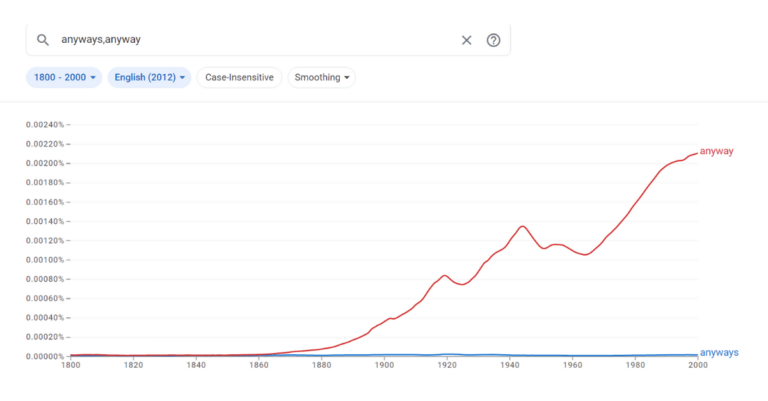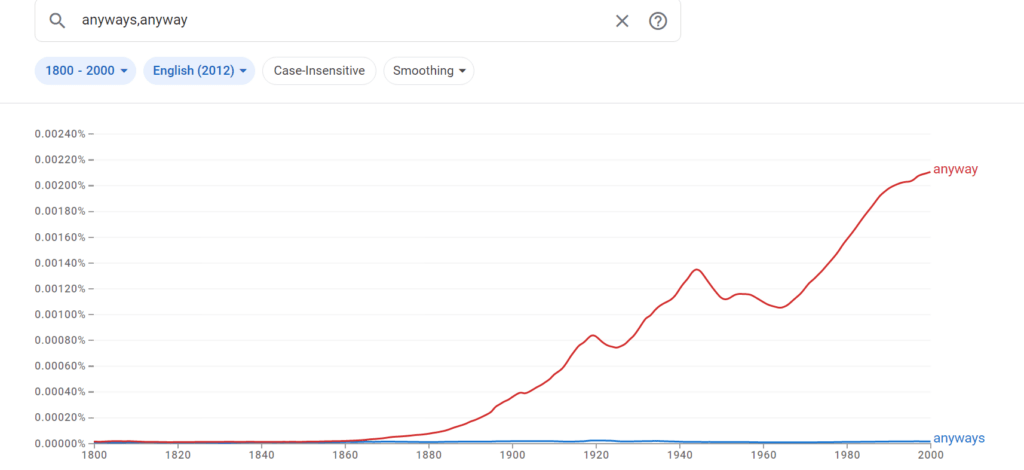Anabell asked, “Is it correct or incorrect to say ‘anyways’ to someone? As in ‘Anyways, call me later!’ ‘Anyways’ sounds like nails on a chalkboard to me.”
Thanks, Anabell!
The standard word is “anyway,” which is probably why the sound of “anyways” bothers you so much. “Anyway” has some other uses, but you’ve probably most likely heard people say it with an S in a sentence like this, where “anyway” is a way of redirecting a conversation back to the topic at hand:
Anyway, we need to get more confetti.
Or maybe in a sentence like this, where “anyway” means something like “regardless”:
Squiggly wasn’t supposed to have access to confetti anymore, but Aardvark bought him some anyway.
Why do people still say ‘anyways’?
From comments I see, a lot of people seem to think that people saying “anyways” is relatively new, but the Oxford English Dictionary has citations for “anyways” in any form going all the way back to the 1200s, and in the way we’ve been talking about going back to 1828.
And I love this quotation from 1927 from a book called “Just Between Us Girls”:
Well, anyways, my dear, it simply slayed me.
Today, “anyways” is considered colloquial, and it’s part of some American dialects, which means you wouldn’t want to use it in a job application or a school essay, but it’s also common in some regions or communities.
According to Google’s Ngram Viewer, which is a decent measure of how often words appear in edited text, mostly books, there has been a steady rise in the use of “anyways,“ even in edited text.
However, “anyway” is still vastly more common. In fact, you can barely even see that the use of “anyways” is rising until you remove “anyway” from the chart because it’s so much more popular it swamps out the instances of “anyways”:
When should you use ‘any way’ and how does it differ from ‘anyway’?
And what about “any way” — two words? Well, in the two-word phrase, the noun “way” is being modified by the adjective “any.” Here’s an example of a sentence where you’d use the two-word version:
Is there any way you could call me later?
Notice how you could substitute another adjective, like “some,” in that sentence. You could say,
Is there any way you could call me later?
But you could also say,
Is there some way you could call me later?
Doing that test — can you substitute a different adjective? — can help you figure out whether you want the one-word version of “anyway,” or the two-word version: “any” and “way.”
The adverb ‘anyway’ used to end with S
And the two-word “any way” leads us to another interesting point. You may have heard that “anyway” can’t take an S because it’s an adverb, but that’s just not true. It’s easy to think of examples that prove it wrong. For example, the adverbs “forwards” and “backwards” are standard in British English (even though we use “forward” and “backward” in American English). “Always” is another adverb that ends with S, and I bet you didn’t know that the adverb “always” was originally two words: “all” and “ways.”
The Motivated Grammar blog explains that “anyway” is just like the adverbs “always” and “sometimes,” which also started out as two words: “some” and “times.” Long ago, English had more words that were something called the adverbial genitive, and some of them — like “always,” “sometimes,” and “anyways” — took an S.
But because English isn’t consistent or predictable, “always” and “sometimes” kept their S and “anyway” lost it, at least as far as for what people want you to use in Standard English today. But knowing where “anyways” comes from maybe helps explain why it keeps showing up and sounds normal to some people.
That’s some interesting history I didn’t expect to find when I started researching this topic, but your quick and dirty tip is still to use “anyway,” and not “anyways,” if you want to not have your words sound like nails on a chalkboard to people like Anabell.
Thanks for the question!





